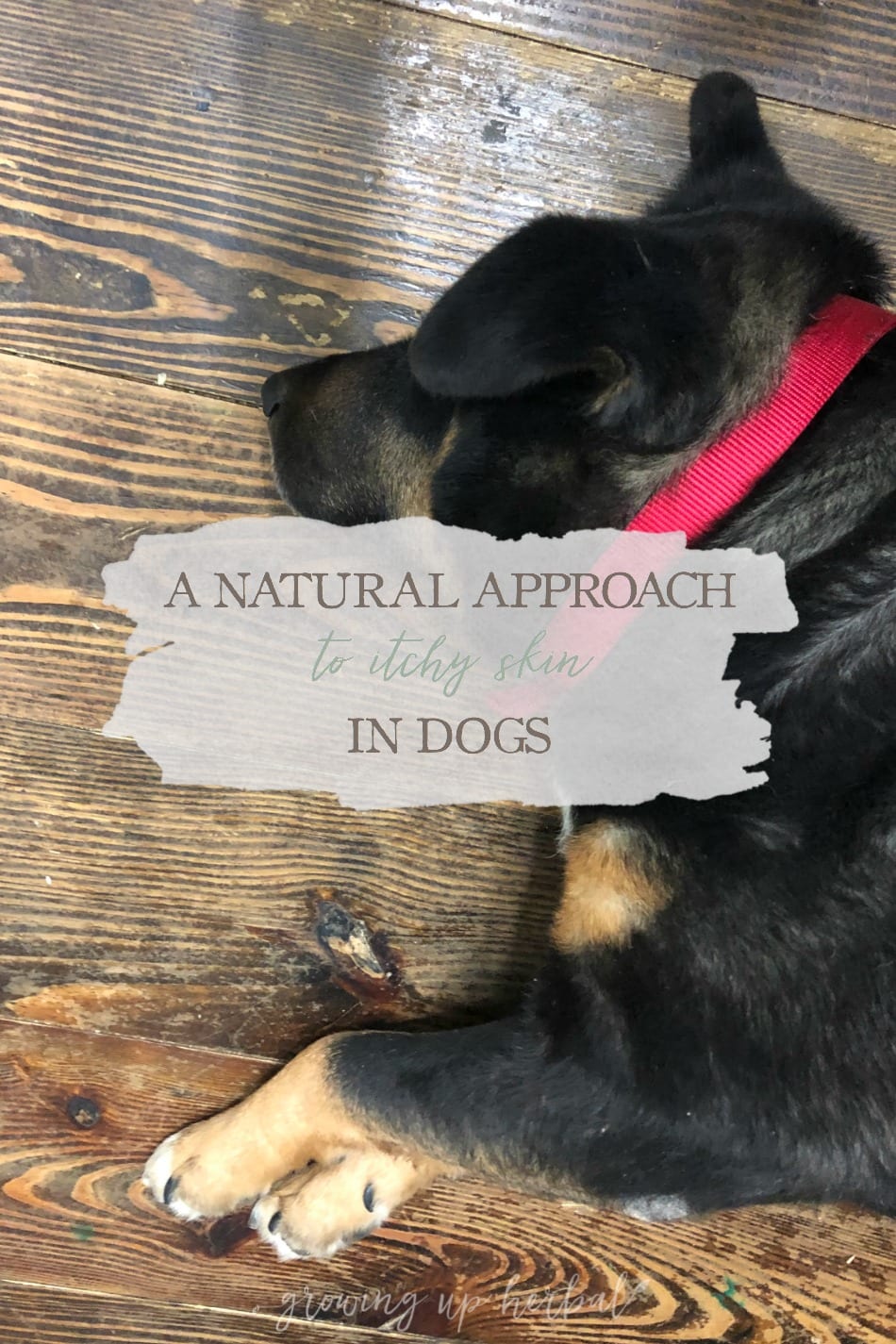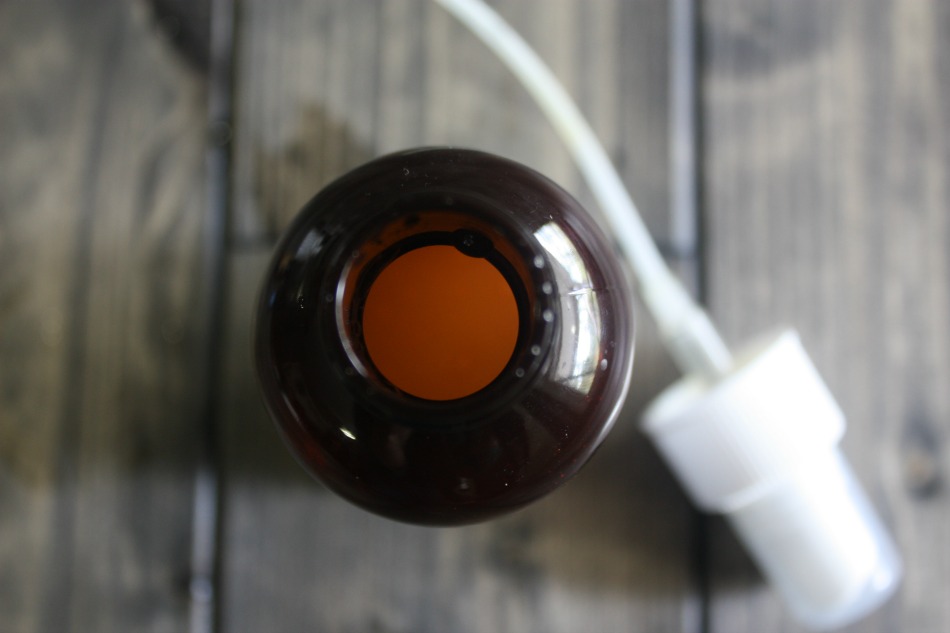
Our dog, a mixed breed we rescued from the shelter 9 years ago, has had recurring skin issues for the last several years. When the itching flairs up, she is one miserable pup. I can hear her whining and biting at her skin. She rubs herself on anything that will scratch the itch, so much so that she bleeds and her hair comes out in clumps. She licks herself constantly, and her mood is somber.
In the past, we’ve tried different things to help.
First, we took her to the vet. The closest veterinarian is a good ole’ country veterinarian whom I respect, but he doesn’t seem to keep up with much current research or practices. He rights her itching off as fleas (not her diet) and recommended flea medicine. At first, we gave it a try, even though I am not a fan of toxic flea medicines, but it didn’t seem to work long-term, so we stopped using it. I should have stuck with my principles here. I mean, if I’ve learned anything about health over the last decade, diet is always the first thing to address when an ailment presents itself.
After going that route and seeing no lasting results, we changed her dog food to higher quality food with better animal protein sources and no grain. That helped quite a bit but not completely.
We also went from bathing her less often, thinking the soap and water were drying her skin out, to bathing her regularly using natural dog shampoos and finishing up with soothing herbal rinses. This had no real effect on her other than that she smells better and is in a better mood when she’s regularly bathed.
So here we are in early fall. She’s been fine for the most part this year, but in the last few weeks, she’s begun to itch more. At this point, my next step is to try to soothe her itchy skin externally and introduce some beneficial herbs into her diet to stimulate her body to heal.
Topical Itch Relief Using Herbs & Essential Oils
When I was thinking about how to soothe her itchy skin from an external perspective, my mind went to the products we use when bathing her. I love this post over on the Herbal Academy called DIY Herbal Pet Shampoo and Rinse for Healthy Skin & Fur. It shares a recipe for a dry shampoo powder and herbal skin rinse. We already use these recipes consistently when bathing her, and they seem to work well.
However, when she gets like she is now, where she’s rubbing raw spots on her skin, I know she needs a little extra support directly on the itchy spots. I immediately thought of the itch salve I make for my kids to help with bug bites and rashes. However, it contains essential oils—something I’m not very knowledgeable about regarding animals.
Thankfully, clinical aromatherapists like Lea Jacobson share tons of information about using essential oils safely—for humans and pets! After searching through her site, I found her blog post on using essential oils on dogs and a post with an itchy skin essential oil recipe. I decided to tweak the itchy skin recipe a bit and use it on our dog several times a day to see if that provides some relief. I added a carrier oil to the recipe because I don’t think witch hazel on its own is enough to safely disperse the essential oils. I also increased the essential oil dilution from 1% to 2% since this is what Lea recommends for an acute physical issue.
When it comes to using essential oils, my first choice is always Plant Therapy. They are a family-run business that offers high-quality essential oils. They even have a newish line of products called Pup & Pony that features essential oil blends that are safe for dogs and horses if that is of interest to you!
Itchy Skin Relief Spray for Dogs
Adapted by Lea Jacobson of UsingEOsSafely.com
Ingredients:
- 2 ounces witch hazel
- 1 teaspoon carrier oil
- 12 drops lavender (Lavandula angustifolia) essential oil
- 8 drops of peppermint (Mentha x piperita) essential oil
- 4 drops of frankincense (Boswellia carteri) essential oil
Directions:
- Combine all ingredients in a glass spray bottle and store at room temperature.
- Shake well before using. Spritz on itchy skin 3-4 times a day.
Internal Herbal Support for Itchy Dogs
While I’ve got a better plan for external relief for our dog’s itchy skin, I still need to approach her itchy skin issue from an internal perspective as well.
Seeing that I have no books on herbs for animals (or on aromatherapy for animals), I headed to the Herbal Academy to see if they had anything to say about itchy skin in dogs. I found their post, An Introduction to Canine Herbalism, which has a recipe for dogs with itchy skin. You make an herb blend of specific dried culinary herbs and sprinkle a small amount over their food daily. The amount you use will be based on your dog’s size. You do this for three weeks before taking a three-week break (one round). You then repeat the whole process, for 3 rounds total. Since I have all these herbs on hand, I’ll definitely implement this into our natural protocol over the next few months to see if it provides her with some relief.
So this is my plan moving forward. If these additional measures don’t provide her with relief, I’ll have to try something else, such as finding a holistic vet in our area as well, although, that’s kind of hard to come by in rural areas, but I’ll give it my best shot! And if you ever find yourself with a miserable dog with itchy skin, I hope this post is somewhat helpful to you!


What an interesting article! I also have a dog with a skin problem. First we found out which meat she could eat, it turned out chicken and rabbit only. Now she gets fresh meat and now and then a dried rabbit ear (which I don’t like but we have no choice)And then we bought vegan dogfood without grain as additional dogfood. This turned out to be a very good choice cause she gained weight. But after a while she became itchy again luckily without the earinfection which is often a symptom of foodallergy. I will try the recipe with the spray and let you know if this works.
Best regards,
Birgit
Our dog has never had an ear infection, so I’m not thinking she has any food sensitivities or allergies, especially since she goes through these cycles of itching once or twice a year, and her food stays the same year-round. I do think the higher quality food has helped to improve her digestion and gut health which, in turn, helps with her overall skin health. And when you get around to trying the spray, I’d love to know how it works for you. Thanks for your comment, Birgit!